HEADINGS ON THIS PAGE
PDF VERSION OF THE PAGE
LINK #2:
DANIEL'S '70 WEEKS' PROPHECY
AN EXPLANATION OF DANIEL 9:24-27
PROLOGUE: THE 'MARK OF THE BEAST' IS HERE!
STARTING: WITH DANIEL'S 70th WEEK
In the past, at the beginning of each page
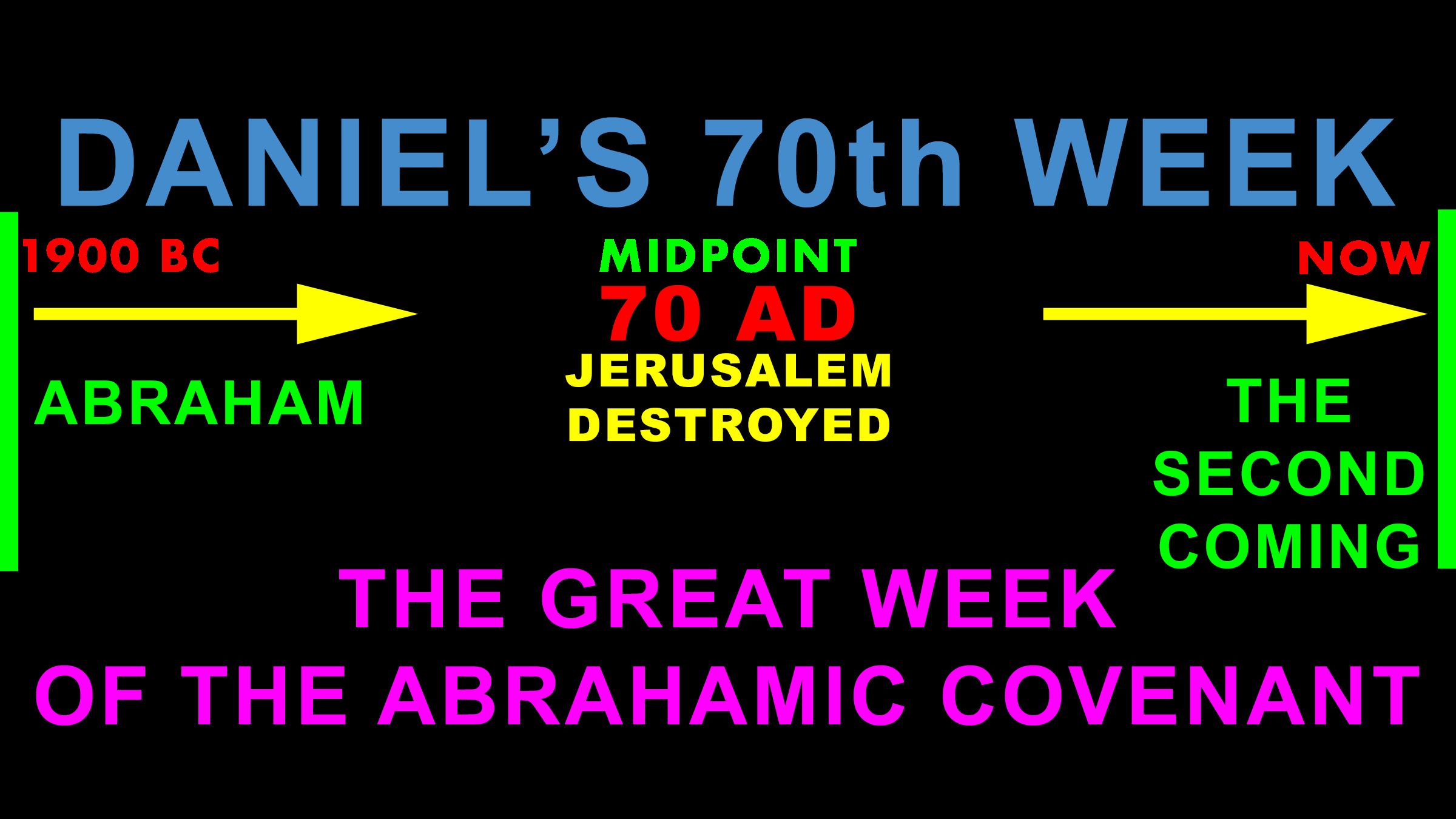
I explained how that, after examining Daniel chapter 9 and Jesus' Olivet Discourse, we can realize that the
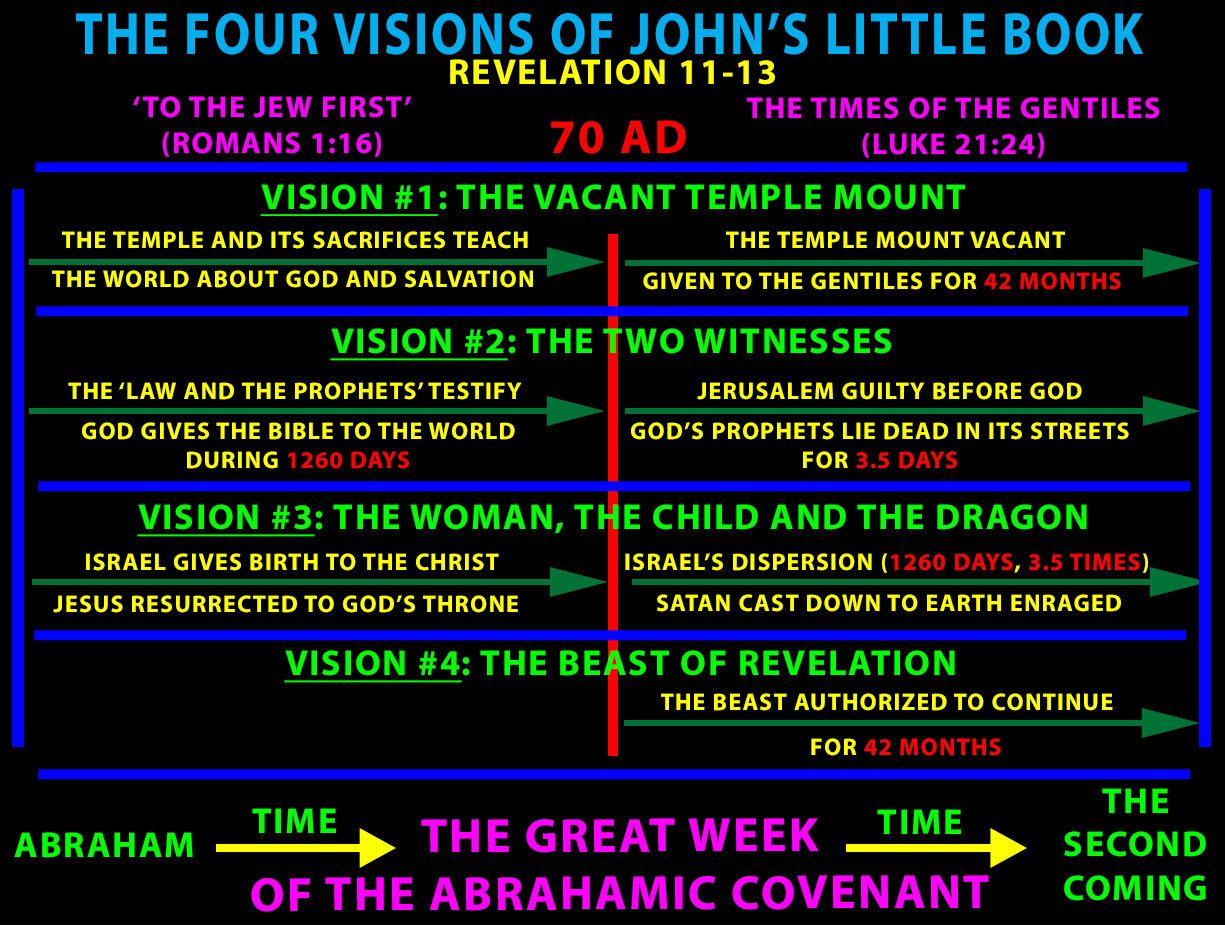
ADDING: CLARIFICATION ABOUT THE MARK
But now, after more recent Bible study and my continued monitoring of world events, I have concluded that another aspect of 'the last days' has come; the 'Mark of the Beast'. It is a 'Mark' that the False Prophet will impose upon the entire world:
The False Prophet causes all, both small and great, rich and poor, free and slave, to receive a Mark FROM their right hand or FROM their foreheads. And that no one may buy or sell except one who has the Mark , or an official name from the Beast, or an official number associated with his official name. Here is wisdom. Let him who has understanding calculate the number from the Beast, for it is the (identification) number of a man: that number is 666. Revelation 13:16-18
Until recently I had suspected that the 'Mark of the Beast' might be a bar code or QR code tattooed upon a person's skin. Or that it might be an RFID chip inserted underneath a person's skin. But with more recent study I have discovered that, in the original Greek of Revelation 13:16, the words 'forehead' and 'hand' were not written in the
And the Greek word translated 'mark' can also be translated as an 'image' or 'impression' of something. And so I now believe that the Beast's 'Mark' is actually a scan taken from people's faces and hands. These comprise the biometric data being collected today by many nations. And it will all come together in a worldwide system of human registration.
This registration of people will be comprised of three things; all three of which are described in Revelation 13:17:
And that no one may buy or sell except one who has 1) the scan (mark, image or impression), and 2) an official name from the Beast, and 3) an official number associated with his official name. Revelation 13:17
I have not yet identified the Beast's official numbering system, based upon a 6-6-6 format. But God is just and fair. And so when the Beast's 'number' does come, I trust that it will be obvious.
My concern, however, regards the fact that most of us are already accustomed to using facial recognition and fingerprint technology. And so the Mark (
In Revelation God has warned that those who embrace this 'Mark' will suffer
Then a third angel followed them, saying with a loud voice “If anyone worships the Beast and his image and embraces his SCAN , taken from his own forehead or from his hand, he himself shall also drink of the wine of the wrath of God; which is poured out full strength into the cup of His indignation. He shall be tormented with fire and brimstone in the presence of the holy angels and in the presence of the Lamb.
And the smoke of their torment ascends forever and ever . And they have no rest day or night, who worship the Beast and his image, and whoever receives the SCAN associated with his own name.” Here is the patience of the saints. Here are those who keep the commandments of God and the faith of Jesus. Revelation 14:9-12
CONCLUSION: WE NEED TO FOCUS
And so combining a knowledge of
DO NOT SUBMIT TO THE MARK ( SCAN ) OF THE BEAST!
So what is it that God is calling Christians to do in this hour? To prepare for death. God now calls upon Christians to follow the three young Hebrew men, who went into the fiery furnace rather than deny their God (Daniel 3). And to follow Daniel, who risked the lion's den rather than to cease worshiping the one true God (Daniel 6). God calls upon Christians to hear His word and to understand the choice that now confronts all of mankind:
Therefore whoever confesses Me (Jesus) before men, him I will also confess before My Father who is in heaven. But whoever denies Me before men, him I will also deny before My Father who is in heaven. Matthew 10:32-33
If we endure, we shall also reign with Him. If we deny Him, He also will deny us. 2 Timothy 2:12
Do not fear any of those things which you are about to suffer. Indeed, the devil is about to throw some of you into prison, that you may be tested. And you will have tribulation ten days. Be faithful until death , and I will give you the crown of life. He who has an ear, let him hear what the Spirit says to the churches. He who overcomes shall not be hurt by the second death (the Lake of Fire and Brimstone). Revelation 2:10-11
And they overcame him (Satan) by the blood of the Lamb and by the word of their testimony, and they did not love their lives to the death. Revelation 12:11
As I explain in my four web pages about
This was the 'great falling away from the faith' that Paul said would accompany the rise of a 'man of sin' (2 Thessalonians 2:3-4). And so today some 'professing Christians' portray the coming of artificial intelligence and other technologies as 'God saving the world'. It is hailed as the arrival of 'peace and safety' (1 Thessalonians 5:3), and of diversity, equity and inclusion. But the simple choice still confronts us. Will we embrace Constantine's 'victory'. Or will we go outside of the world's 'wide gate' (Matthew 7:13) and meet the Savior there?
The Spirit Himself bears witness with our spirit that we are children of God. And if children, then heirs. Heirs of God and joint heirs with Christ, if indeed we suffer with Him , that we may also be glorified together. Romans 8:16-17
Therefore Jesus also, that He might sanctify the people with His own blood, suffered outside the gate (of Jerusalem). Therefore let us go forth to Him, outside the camp, bearing His reproach. For here we have no continuing city, but we seek the one to come. Hebrews 13:12-14
________________________
LINK #2:
DANIEL'S '70 WEEKS' PROPHECY
This is the
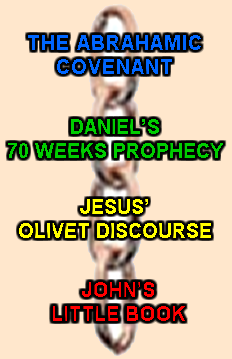
DANIEL'S CIRCUMSTANCES
The prophet Daniel lived approximately 400 years after King David. Daniel was probably born around 620 BC. David's son, King Solomon, had built the great Temple in Jerusalem around 1000 BC. But after Solomon's death the nation of Israel split into two parts; the northern Kingdom of Israel (comprised of 10 tribes), and the southern Kingdom of Judah (from which the name 'Jew' derives). After this division of the nation, the Kingdom of Israel began to stray farther and farther away from God.
The northern Kingdom of Israel was conquered and destroyed by Assyria around 720 BC. But the northern 10 tribes were not completely lost. Many of them fled from the Assyrian invasion to take refuge in Judah and Jerusalem.
After 720 BC, the remaining Kingdom of Judah (where Daniel lived) continued on until it fell under Babylonian domination. These conquests of the two kingdoms of Israel and Judah represented the judgments of God, because they had departed from Him and His laws. The Biblical prophets loudly warned the people of both kingdoms that God's judgments were coming; warnings that we can still read in the Bible today.
When David's Kingdom of Judah first submitted to Babylon (around 605 BC, when Daniel would have been roughly 15 years old) the Babylonian king, Nebuchadnezzar, confiscated much of Judah's wealth and put Judah under taxation. He also took many of its best and brightest young people back to Babylon to serve him. And Daniel was one of those first captives taken to Babylon. His story is recorded for us in the book of Daniel.
While he lived in Babylon, Daniel watched his countrymen from a distance as they continued to disobey God and rebel against Nebuchadnezzar. And so, in 586 BC, Babylon brought complete desolation and upon the Jewish people. Nebuchadnezzar destroyed the city of Jerusalem and its great Temple, bringing an apparent end to the Mosaic Covenant. And he removed David's family from power, ending the Davidic Dynasty (there has not been another king from David's family who has ruled in Israel since that time).
But for Daniel and the Jewish people, the desolation of the kingdom of Judah was not the end of the story. Nebuchadnezzar dragged the chained survivors all the way back to that part of the world where Abraham had first begun 1300 years earlier. God could not have made His fierce anger toward Israel more clear.
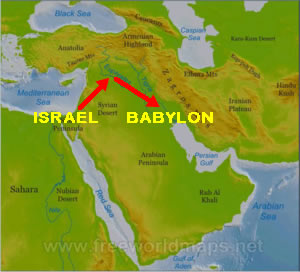
ABRAHAM'S JOURNEY REVERSED
As a devout God-fearing man, the destruction of his homeland raised serious questions in Daniel's mind. Foremost among them were 1) 'Does Israel have a future?' and 2) 'What will become of the covenant promises of God?'; His covenants with Abraham, Moses and David?
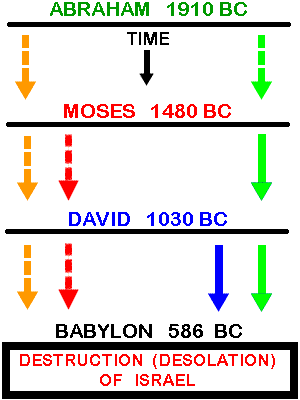
586 BC: THE END OF GOD'S PROMISES?
God's answers to Daniel's questions are found in the book of Daniel, and are foundational to the prophecy section of this web site. Daniel was a faithful servant of God, and his character is important for all Christians to study and follow. But his prophecies are even more important, because Daniel lived at one of the great crossroads of world history; when God's covenant promises to
SORTING DANIEL'S PROPHECIES
There are five prophecies in the book of Daniel. Four of those prophecies, in chapters 2, 7, 8 and 11, focus upon the restoration of David's kingdom (and thus also Abraham's possession of the promised
The fifth prophecy, in Daniel chapter 9, provides two timetables; a 69-week timetable leading up to first coming of Abraham's Seed ('Messiah the Prince', Daniel 9:25) to provide
DANIEL 9:24
The 70 Weeks prophecy is comprised of four verses, found in Daniel 9:24-27:
Seventy weeks are determined upon your people and upon your holy city (Jerusalem); to finish the transgression , to make an end of sins and to make reconciliation for iniquity . To bring in everlasting righteousness , to seal up the vision and prophecy and to anoint the most Holy . Daniel 9:24
This verse provides the 'big picture' of the prophecy; what will be the final outcome at the end of 70 weeks. It is about Daniel's people (the Jews) and their holy city (Jerusalem). More specifically it is about Israel coming into full possession of the two blessings of the Abrahamic Covenant; God's
The first part of the verse defines salvation: that sin would be dealt with, and everlasting righteousness would be established. These are the two parts of salvation that are experienced by anyone entering into the grace of God (Jew or Gentile); deliverance from the
In addition God foretold that all prophecy would be fulfilled, and the 'most Holy' would be annointed. Who or what is the 'Most Holy' referred to here? There are various opinions. Some say it is the Messiah. Some believe that it refers to a rebuilding of the Temple.
In Israel's history a new king was always annointed upon taking his throne. And so, personally, I suspect that the 'Most Holy' is Jesus Christ, the "Holy One of Israel":
For the Lord is our defense, and the Holy One of Israel is our King.
Psalm 89:18
Fear not Jacob, you worm, and you men of Israel. "I will help you" says the Lord and your Redeemer; the Holy One of Israel.
Isaiah 41:14
I am the Lord, your Holy One; the creator of Israel, your King.
Isaiah 43:15
As for our Redeemer, the Lord of hosts is His name; the Holy One of Israel.
Isaiah 47:4
In these verses the 'Holy One of Israel' is described as both a 'Redeemer' and a 'King'. And this is the order of things that we find in Daniel 9:24;
DANIEL 9:25
Know therefore and understand that from the going forth of the commandment to restore and to build Jerusalem, unto Messiah the Prince , shall be seven weeks and sixty-two weeks. The street shall be built again, and the wall, even in troublesome times. Daniel 9:25
God told Daniel that after a period of 69 weeks (7 weeks + 62 weeks) the Messiah and 'Prince of David' would come. These 'weeks' would be 'weeks of years', each week being 7 years long. And the 69 weeks would begin with the permission allowing the Jews to rebuild Jerusalem.
It is important to be clear about this permission. The Jewish people received two separate permissions to rebuild in their homeland. The first permission, given by King Cyrus of Persia, was to rebuild their Temple. This permission is recorded in the book of Ezra (Ezra 1:1-4), and was given around 536 BC. But the permission to rebuild the city of Jerusalem was given 90 years later; by King Artaxerxes I of Persia in 445 BC (Nehemiah 2:1-10).
It is interesting to notice that God Himself providentially distinguished these permissions for the Jewish people and the world. After the Jews had begun to rebuild the Temple, their enemies wrote to the king of Persia claiming that they were rebuilding the city of Jerusalem (Ezra 4:12-16). As a result the Jews were forbidden to continue their work. It was not until everyone understood that they only had permission to rebuild the Temple, that God then blessed their progress on that project.
Why does God divide the 69 weeks into 7 weeks and 62 weeks? Again, there are many opinions. My own thought is that, although the city's gates and walls were rebuilt miraculously in 52 days (Nehemiah 6:15), it may not have been fully rebuilt internally and repopulated until 7 'weeks' (49 years) had passed (Nehemiah 7:4).
DANIEL 9:26
And after the sixty-two weeks shall Messiah be cut off, but not for himself. And the people of the prince that shall come shall destroy the city and the sanctuary; and the end thereof shall be with a flood. And unto the end of the war desolations are determined. Daniel 9:26
In this verse God showed Daniel two outwardly visible, historical events that would follow the Messiah's coming. It is the story of two princes:
These predictions were both fulfilled in the crucifixion of Jesus Christ, and the destruction of Jerusalem and its Temple by the armies of Rome in 70 AD (led by the Roman prince Titus, son of the Emperor Vespasian).
Titus, the Prince
It is important to understand how Titus became a Prince of Rome. The Jewish people rebelled against the Roman Empire in 66 AD. And Rome sent a general named Vespasian to put down that rebellion. But in 69 AD, while Vespasian was making progress in crushing the Jewish rebellion, civil war broke out back in Rome. The emperor Nero had died, and then three different men fought over who would be the next emperor. And so Vespasian went back to Rome to end the civil unrest, and made himself the next emperor of Rome.
And when Vespasian left Israel, he left his son Titus in charge of the armies of Rome. A so when Vespasian became the Emperor of Rome and began a new dynasty (the Flavian Dynasty), Titus became a prince of Rome (and eventually became the next emperor after his father). It is in this context that we can understand three reasons why Titus might have wanted to crush Israel as though a 'flood' had hit it:
Israel's wealth was very important to the Flavian Dynasty. In fact when Titus began to bring that wealth back to Rome, Vespasian used it to tear down the palace of Nero, and to build the Roman Colosseum in its place.
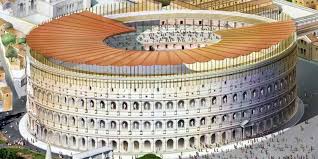
THE FLAVIAN AMPHITHEATER
COURTESY OF ISRAEL
DANIEL 9:27
He will confirm a covenant with many for one week (the 70th week). But in the middle of that week he will bring sacrifices and offerings to a halt. On the wing of abominations will come one who destroys, until the decreed end is poured out on the one who destroys.
Daniel 9:27, New English Translation
This verse contains three separate sentences. The first two sentences tell us that 'he' shall do two separate things:
These first two sentences confront us with a challenging question that requires an answer: "Who is this 'he' that is being referred to?" We are limited to two choices; it must be one of the two princes in verse 26. Is must be either "Messiah the Prince" (of Israel) who came and died after 69 'weeks', or "the prince that shall come"; whose people would destroy the city and the Temple. And perhaps the best way to answer this question is to ask ourselves how Daniel would have answered it.
WOULD DANIEL HAVE EXPECTED THE MESSIAH TO RISE FROM THE DEAD?
The answer to this question is a definite 'Yes!' Not only would Daniel have been open to the possibility that the Messiah would be raised from the dead; he would never have considered any other possibility, for three reasons:
- The Messiah would have to be resurrected in order to become the 'stone cut out without hands' of Daniel 2:34-35, that crushes Gentile kingdoms to powder (Matthew 21:44, Luke 20:18). And He would have to be raised from the dead in order to be the 'Son of Man' who comes to the 'Ancient of Days' in Daniel 7:13-14; to receive an everlasting kingdom.
For you will not leave My soul in Hades. Nor will you allow your Holy One to see corruption (bodily decay).
Psalm 16:10 (Acts 2:27, 13:35)
Therefore will I divide Him a portion with the great, and He shall divide the spoil with the strong. Because He has poured out His soul unto death, and He was numbered with the transgressors. He bore the sin of many, and made intercession for the transgressors.
Isaiah 53:12
WOULD DANIEL HAVE EXPECTED THE MESSIAH TO CONFIRM A COVENANT?
Some have understood this word 'confirm' to mean that someone would make or establish a new covenant. But this is not true. In the original Hebrew version of Daniel 9:27, the word translated 'confirm' expresses the idea of honoring or enforcing a covenant that already exists. God was talking about someone fulfilling a covenant that had already been made. The explanation is simple.
When God made His covenant with Abraham, it was like a contract; what is called in English an 'I-O-U' (I owe you). Although God's gracious promise was trustworthy, it existed only on paper; the money had not yet been 'put in the bank' so to speak. The actual work of redemption for sinful mankind had not yet been done. But when the Lord Jesus came into the world and died on the cross, He paid the price to make God's blessing on all the nations of the world a reality.
This is what Jesus meant when He said "It is finished" just before He died. He was saying 'It is paid!' (John 19:30). He confirmed the Abrahamic covenant. Jesus further fulfilled this covenant when He ascended into heaven and presented His own blood before His Father as proof that our sins had been atoned for (Hebrews 9:12,24).
This is what Daniel 9:27 is telling us; that it is the Messiah who would confirm a covenant for one Week; the final 70th week of this prophecy. Through His death Jesus confirmed the Abrahamic covenant backward in time to all those who, like Abraham, had looked forward to its fulfillment; and forward in time to all those who would look back to His finished work upon the Cross.
In Malachi chapter 3 the coming Messiah was called "the Messenger of the Covenant":
"Behold, I will send my messenger (John the Baptist), and he shall prepare the way before me. And the Lord, whom you seek, shall suddenly come to His temple; even the Messenger of the Covenant, whom you delight in. Behold, He shall come" says the Lord of hosts.
Malachi 3:1
In Luke chapter 1, the virgin Mary expressed her joy at receiving God's grace, and spoke of the salvation that her unborn child would achieve:
He (God) has helped His servant Israel in remembrance of His mercy, as He spoke to our fathers: to Abraham and to his Seed forever.
Luke 1:54-55
Also in Luke chapter 1, Zacharias (the father of John the Baptist) described Christ's coming as God 'remembering His Covenant' and 'performing the mercy' which He had promised:
Zacharias was filled with the Holy Spirit and prophesied, saying "Blessed be the Lord God of Israel, for He has visited and redeemed His people, and has raised up a horn of salvation for us in the house of his servant David. As He spoke by the mouth of His holy prophets, which have been since the world began: that we should be saved from our enemies, and from the hand of all that hate us. To perform the mercy promised to our fathers, and to remember His holy covenant; the oath which He swore to our father Abraham.
Luke 1:67-73
The Apostle Peter alluded to Christ's confirmation of the Abrahamic Covenant, telling the Jews that they would be the first to be offered the blessings of that confirmation:
You are the children of the prophets, and of the covenant which God made with our fathers, saying unto Abraham "And in your seed shall all the kindreds of the earth be blessed". Unto you first God, having raised up his Son Jesus, sent Him to bless you, in turning away every one of you from his iniquities.
Acts 3:25-26
In his first missionary message on the continent of Asia, as he spoke to Jews in a synagogue in Pisidian Antioch, Paul said:
Men and brethren, sons of the family of Abraham, and those among you who fear God, to you the word of this salvation has been sent.
And we declare to you glad tidings; that promise that was made to the fathers (Abraham, Isaac and Jacob). God has fulfilled this for us, their children, in that He has raised up Jesus (from the dead). As it is written in the second Psalm 'You are My Son. Today I have begotten you'.
Acts 13:26,32-33, Psalm 2:7
And Paul described Jesus as a covenant-Confirmer in Romans 15:
Now I say that Jesus Christ was a minister of the circumcision for the truth of God, to confirm the promises made unto the fathers.
Romans 15:8
Daniel would have been very open to the idea that a resurrected Messiah would be the covenant-confirmer of verse 27. In fact he would never have considered anyone else. There is no other Person in the Bible, other than 'Messiah the Prince' (verse 25), promised 'Blesser of the nations' and 'Son of David', who is spoken of in 'covenant-confirming' terms. The 70 Weeks Prophecy begins in verse 24 with a reference to Daniel's people (the Jews), and their holy city of Jerusalem. The message is about sealing up (confirming, fulfilling) 'vision and prophecy'. This is the context within which God expects us to understand the 'he' of verse 27.
WOULD DANIEL HAVE EXPECTED THE MESSIAH TO END THE MOSAIC SACRIFICES?
Again the answer is 'Yes'. First of all Daniel knew, through King David's 40th Psalm, that God would someday replace the Mosaic animal sacrifices with a better sacrifice:
Sacrifice and offering You did not desire, but You have prepared a body for Me. In burnt offerings and sacrifices for sin You had no pleasure. Then I said "Behold, I have come (in the volume of the book is it written of Me) to do your will O God".
Hebrews 10:5-7, Psalm 40:6-8)
And Daniel might have also been aware of the prophecy of Jeremiah (a prophet who lived at the same time as Daniel). Jeremiah foretold that the old Mosaic Covenant was going to be replaced:
"Behold, the days are coming" says the Lord, "that I will make a new covenant with the house of Israel, and with the house of Judah. Not according to the covenant that I made with their fathers in the day that I took them by the hand to bring them out of the land of Egypt (the Mosaic Covenant); which covenant they broke, although I was a husband unto them" says the Lord. "But this shall be the covenant that I will make with the house of Israel: After those days" says the Lord, "I will put My law in their inward parts, and write it in their hearts. And I will be their God, and they shall be My people. And they shall teach no more every man his neighbor, and every man his brother, saying 'Know the Lord'. For they shall all know Me, from the least of them unto the greatest of them" says the Lord. "For I will forgive their iniquity, and I will remember their sin no more.
Jeremiah 31:31-34 (Hebrews 8:7-13)
Jesus announced the coming of His New Covenant at the 'Last Supper' (Matthew 26:28):
And as they were eating, Jesus took bread and blessed it and broke it, and gave it to the disciples. And He said "Take, eat; this is my body". And He took the cup, and gave thanks, and gave it to them saying "Drink all of it. For this is My blood of the New Covenant, which is shed for many for the remission of sins.
Matthew 26:26-28
John the Baptist was the last and greatest of the Old Covenant Levitical priests. And his entire ministry was about helping the people of Israel to transition from the Old Covenant of Moses, to a New Covenant established by the true 'Lamb of God'. But the Jewish people hated the idea that the Messiah would bring an end to the Mosaic sacrifices; even though David, Jeremiah, Daniel and John the Baptist had all foretold it.
The approaching destruction of the Temple, and the ending of animal sacrifices, was a major point of disagreement between the Jews and Christians. Stephen, the first martyr, was killed for declaring that the Mosaic Covenant would end (Acts 6:14). And Paul was hounded by the Jews because he was accused of disrespecting Moses and the Temple.
Jesus accomplished two important things with the destruction of the Temple. First, it demonstrated to the Jews and to the world that He is the Messiah. The fulfillment of His warnings about the coming destruction of Jerusalem confirmed that He had been sent by His Father, and that His words were the words of God.
Secondly, Jesus was revealing that He Himself is the true and final 'Passover Lamb of God'. If the Temple had not been destroyed, there might still today be people sacrificing bulls, sheep and goats in Israel and elsewhere. This would have been truly dishonoring to Moses, because Moses wanted his powerless sacrifices to be replaced. He yearned for the promised Messiah and His genuine salvation. The destruction of the Temple has revealed the Mosaic Covenant for what it really was, and still is to this day; a 'teacher' to point us to the true Lamb of God (Galatians 3:24-25).
SATAN: THE ABOMINATION THAT BRINGS DESOLATION
Here I present my own understanding of the third and final sentence of Daniel 9:27; that the one who comes upon the 'wing of abomination' to bring 'desolation' is Satan. And in order to support my interpretation of this sentence (an interpretation that is not commonly taught), I begin by presenting four different English translations of Daniel's original Hebrew version of the sentence. And in each sentence I highlight Satan in red:
On the wing of abominations will come one who destroys , until the decreed end is poured out on the one who destroys .
Daniel 9:27, New English Translation
And on the wing of abominations will come one who makes desolate , even until a complete destruction, one that is decreed, is poured out on the one who makes desolate .
Daniel 9:27, New American Standard Bible, 1995 Edition
And on the wing of abominations shall come one who makes desolate , until the decreed end is poured out on the desolator .
Daniel 9:27, English Standard Version
And upon the wing of abominations shall come one who makes desolate , until the decreed end is poured out on the desolator .
Daniel 9:27, Revised Standard Version
Perhaps the first thing that should be considered is that Satan is portrayed in the Bible as a winged being. In Ezekiel 28 he is called a 'cherub', which is a winged angel. And in the book of Revelation he is called a 'dragon', which is also a winged creature.
Secondly, the Bible describes Satan in terms of pure evil. In the original Hebrew, the word translated 'abomination' means 'the utmost evil or wickedness'. Jesus repeatedly referred to Satan as 'the evil one'. And in John 8:44 Jesus said that Satan was a murderer from the beginning, and the 'father of lies'. And so in summary, this third sentence of Daniel 9:27 refers to a winged being who is utterly evil.
The casting of Satan out of heaven and down to earth, by the Lord Jesus Christ, is one of the great themes of the entire Bible:
How you are fallen from heaven , O Lucifer, son of the morning! How you are cut down to the ground , you who weakened the nations! For you have said in your heart ‘I will ascend into heaven. I will exalt my throne above the stars of God. I will also sit on the mount of the congregation, on the farthest sides of the north. I will ascend above the heights of the clouds. I will be like the Most High'. Yet you shall be brought down to Sheol , to the lowest depths of the Pit .
Isaiah 14:12-15
“By the abundance of your trading you became filled with violence within, and you sinned. Therefore I cast you as a profane thing out of the mountain of God . And I destroyed you, O covering cherub, from the midst of the fiery stones. Your heart was lifted up because of your beauty. You corrupted your wisdom for the sake of your splendor. I cast you to the ground , I laid you before kings; that they might gaze at you. You defiled your sanctuaries by the multitude of your iniquities; by the iniquity of your trading. Therefore I brought fire from your midst. It devoured you. And I turned you to ashes upon the earth in the sight of all who saw you.
Ezekiel 28:16-18
At the 'last supper' with His disciples, Jesus foretold that God's judgment of Satan would be one of three messages that the Holy Spirit would declare to the world:
And when the Holy Spirit has come, He will convict the world of sin, and of righteousness, and of judgment. Of sin, because they do not believe in Me. Of righteousness, because I go to My Father and you see Me no more. Of judgment , because the ruler of this world is judged .
John 16:8-11
And the apostle Paul spoke of Christ's triumph over Satan through the cross:
Having wiped out the handwriting of legal requirements that was against us, which was contrary to us. And He has taken it out of the way, having nailed it to the cross. Having disarmed principalities and powers , He made a public spectacle of them, triumphing over them in it.
Colossians 2:14-15
To summarize, the three sentences of Daniel 9:27 correspond to the three things that the Lord Jesus Christ would be empowered to do as a result of His death:
And since then God has used Satan as His means of 1) destroying the Temple, 2) bringing judgment upon the Jewish people, 3) openly declaring the victory of His Christ; and 4) warning the world that our own future judgment is now a certainty as well.
LOOKING FORWARD
In three of my other prophetic web pages I say more to support my claim that Satan is the subject of the third sentence of Daniel 9:27.
While Satan's defeat and fall from heaven is described in Daniel 9:27 as someone coming on 'the wing of abomination to bring desolation', this same historical event is described in Daniel 11:31 and 12:11 as simply the 'ABOMINATION OF DESOLATION'. And in my next 'link' in this prophetic series,
In my 4th 'link' in this prophetic series, titled
And in my page titled
